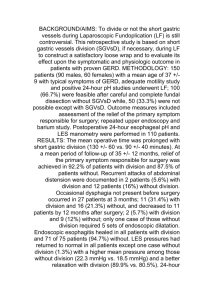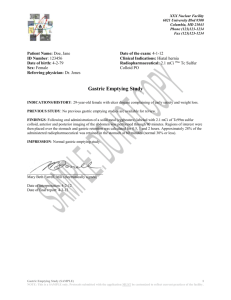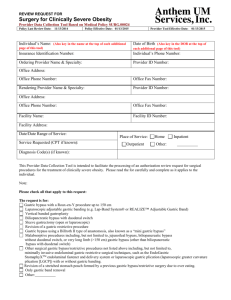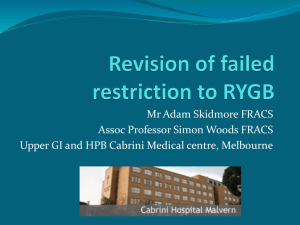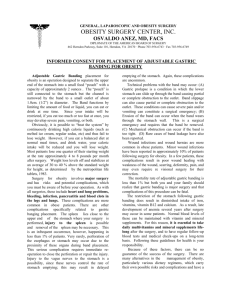PRE-OPERATIVE ASSESSMENT
advertisement
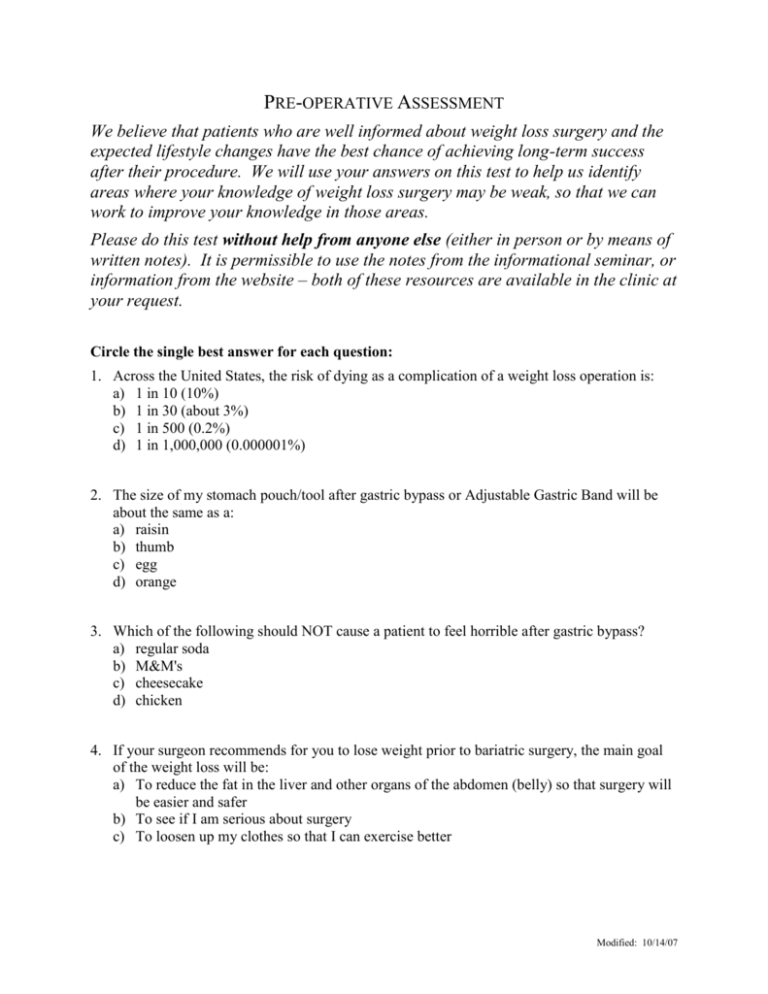
PRE-OPERATIVE ASSESSMENT We believe that patients who are well informed about weight loss surgery and the expected lifestyle changes have the best chance of achieving long-term success after their procedure. We will use your answers on this test to help us identify areas where your knowledge of weight loss surgery may be weak, so that we can work to improve your knowledge in those areas. Please do this test without help from anyone else (either in person or by means of written notes). It is permissible to use the notes from the informational seminar, or information from the website – both of these resources are available in the clinic at your request. Circle the single best answer for each question: 1. Across the United States, the risk of dying as a complication of a weight loss operation is: a) 1 in 10 (10%) b) 1 in 30 (about 3%) c) 1 in 500 (0.2%) d) 1 in 1,000,000 (0.000001%) 2. The size of my stomach pouch/tool after gastric bypass or Adjustable Gastric Band will be about the same as a: a) raisin b) thumb c) egg d) orange 3. Which of the following should NOT cause a patient to feel horrible after gastric bypass? a) regular soda b) M&M's c) cheesecake d) chicken 4. If your surgeon recommends for you to lose weight prior to bariatric surgery, the main goal of the weight loss will be: a) To reduce the fat in the liver and other organs of the abdomen (belly) so that surgery will be easier and safer b) To see if I am serious about surgery c) To loosen up my clothes so that I can exercise better Modified: 10/14/07 5. After a gastric bypass, the average person will lose what percentage of their excess weight? a) 20% b) 50% c) 70% d) 100% 6. What is the opinion of the surgeons of New Dimensions about the relative merits of the gastric bypass, the Adjustable Gastric Band, and the sleeve gastrectomy? a) The gastric bypass is best b) The Adjustable Gastric Band is best c) The sleeve gastrectomy is best d) Patients who are candidates for all 3 procedures must make their own decision based on their own preferences, given fullest possible knowledge about the available procedures. 7. The medical definition of successful weight loss after a bariatric surgical procedure is to lose at least 50% of excess weight, and still be on the light side of that threshold 5 years later. About what percentage of patients do NOT achieve this goal? a) 1% b) 5% c) 15% d) 40% e) 50% 8. After gastric bypass, Adjustable Gastric Band, or sleeve gastrectomy I may develop a deficiency of: a) Iron b) Calcium c) Protein d) Vitamin B12 e) any of the above 9. If I look and feel perfect after weight loss surgery: a) I will skip my followup clinic visits, because they will not be necessary. b) I will keep the planned clinic appointments, so that the surgeon and staff can help me avoid long term weight or nutritional problems. I also recognize that the surgeon and staff appreciate the positive feedback of seeing patients who succeed and will use the data thus provided to improve the care of other patients. Modified: 10/14/07 10. What is the most common cause of failure to lose the expected amount of weight after bariatric surgery? a) staple line breakdown/band rupture b) eating the wrong foods c) stretching the stomach or outlet d) eating too much food 11. After a gastric bypass or Adjustable Gastric Band I will lose weight because: a) I won't absorb fat in my diet b) I will have diarrhea c) I will eat less food d) I will burn fat better 12. Assume for a moment that you will undergo Adjustable Gastric Band placement, and circle the correct statement below: 1) I will be provided with a kit that will enable me to adjust my Band when necessary 2) The Band should only be adjusted by trained medical professionals 13. Which of the following problems is most likely to get better after weight loss surgery? a) Depression b) Diabetes c) Marital stress d) Arthritis 14. All of the following are characteristic of dumping syndrome except: a) Diarrhea b) Sweating c) Dropping things d) Fainting 15. In a sleeve gastrectomy operation, which part of the body is removed? a) The left big toe b) 10 inches of upper intestine c) The large “reservoir” section of the stomach d) The spleen Modified: 10/14/07 16. Following gastric bypass or Adjustable Gastric Band, the best time to begin regular exercise is: a) as soon as cleared by the surgeon b) when there is no more pain from the incision(s) c) when my energy level improves as a result of the weight loss d) when I find out where my weight will settle without exercise 17. Which of the following is NOT a potential complication of gastric bypass and Adjustable Gastric Band? a) gastrointestinal leak b) bleeding internally c) breathing problems d) anemia caused by Vitamin B12 deficiency e) blood clots in the legs with risk to lungs f) any of the above may occur after weight loss surgery 18. All but one of the drugs listed below will increase the chance of ulcer after gastric bypass or Adjustable Gastric Band, and should not be used. Which one of these drugs is OK to use? a) Aspirin b) NSAIDs (ibuprofen, naproxen, and other pain meds used for arthritis) c) Tylenol d) nicotine (smoking) 19. After placement, how often is the Adjustable Gastric Band system is likely to be adjusted? a) Every month for two years, then as needed b) 3-6 times in the first several months, then as needed c) Once or twice 20. True or False (circle one): The gastric bypass or the Adjustable Gastric Band operation will cure the underlying cause of obesity in most patients. 21. The weight loss operation is generally "reversed" (stomach sections hooked back together, or Band removed) at approximately the following time after surgery: a) 2 years b) 5 c) 10 d) never Modified: 10/14/07 22. If I don’t lose weight as I hope to after weight loss surgery: a) I will skip my followup clinic visits, because I will be ashamed of failing and I will not want to face the surgeon or the clinic staff b) I will keep the planned clinic appointments, because I believe that the surgeon and staff may be able to help me succeed in a situation that I could not handle alone. I also recognize that the surgeon and staff appreciate the opportunity to learn from patients who have problems, and will use the data thus provided to improve the care of other patients. 23. Six months after bariatric surgery, I should be eating a maximum of day: a) 2 b) 3 c) 6 d) 8 meals per 24. How long should it take to eat a meal? a) 10-15 minutes b) as long as necessary to consume at least 15 grams of protein c) 45-60 minutes d) 20-30 minutes 25. Which of the following is the correct combination for consuming solids and liquids: a) solids and liquids together b) liquids immediately after solids only c) liquids immediately before solids only My signature below certifies that I answered the questions on this test without the assistance of any other person. Patient Name Date Reviewed by Modified: 10/14/07
